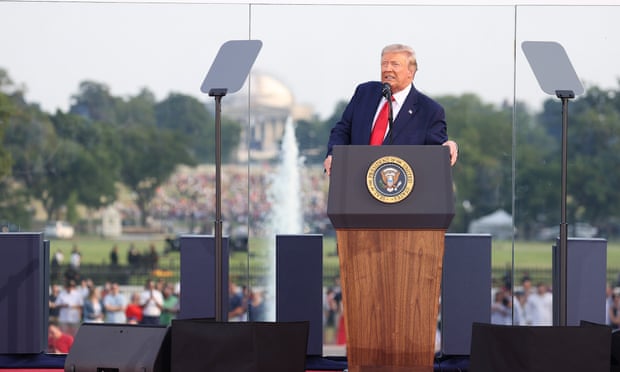Trump Latest News today: US President Donald Trump has claimed that 99 % of the US COVID-19 cases are totally harmless. Donald Trump Said in the 4th J ...
US Economy Today | Coronavirus Has Shaken The US Economy | Do Whatever It Takes, Economist Says

Getty Images
Coronavirus brings US economy to halt.
US Economy is badly hurt by the out break of coronavirus. According to experts US economy has made it's way towards the recession. The most fiery thing is that how is US going to recover from it as almost 80 million of worker are forced to stay at home and all businesses are almost reached to halt.
The U.S. is entering a recession. The ultimate fear is that could turn into a protracted malaise that has some flavor of a depression.
That’s far from the base case, with many analysts and investors taking heart from signs of revival in the original epicenter of the coronavirus -- China -- and predicting a second-half upturn in the U.S. after the contagion hopefully subsides.
But as business activity halts and layoffs surge, some prominent economy watchers -- including former White House chief economists Glenn Hubbard and Kevin Hassett and former Federal Reserve Vice Chairman Alan Blinder -- have drawn comparisons to the Great Depression, though they’ve stopped well short of forecasting another one.
The U.S. undoubtedly will suffer a huge economic contraction as businesses close and Americans stay home. By some estimates, the economy is headed toward its worst quarter in records since 1947. JPMorgan Chase & Co. expects gross domestic product to shrink at an annualized rate of 14% in the April-June period while Bank of America Corp. and Oxford Economics both see a 12% drop. Goldman Sachs Group Inc. sees a 24% plunge.
In a Bloomberg interview on Sunday, Federal Reserve Bank of St. Louis President James Bullard predicted the unemployment rate may hit 30% in the second quarter because of shutdowns to combat the coronavirus, with an unprecedented 50% drop in GDP.
According to NYT, Just as there is a public health strategy driving the government orders closing businesses and limiting daily activity outside the home, there is also an economic strategy for putting large parts of the economy on ice. It requires aggressive action by the federal government, funded by what would be the most expansive borrowing the country has seen since World War II.
Whether the United States looks back at those job cuts as a quick blip of prevention or a devastating spiral into an economic depression depends a lot on what Congress and President Trump do in the next few days.
The United States is already falling into a sharp economic contraction: It is producing far fewer goods and services now than it did a month or a quarter ago. That contraction will persist as long as businesses are unable to open and people are not able to work. This is not happening because of any choices those workers or businesses made; it’s a mandate from the government that has frozen a lot of economic activity.
At some point — possibly when a vaccine for the virus comes to market, or possibly as soon as the rate of infection starts declining and widespread testing allows for more confidence that another surge is not imminent — governments will lift their restrictions and activity will start to thaw.
Federal Reserve announced unlimited bond purchases to help US economy against coronavirus.
Economists have said “do whatever it takes” moment for the Fed.
The Federal Reserve announced Monday an unlimited expansion of bond purchasing programs to backstop the U.S. economy, as millions of American households and businesses are getting crushed by the near total shutdown of daily life to fight the coronavirus.
The Fed is taking swift action never done before in its history to ensure businesses, individuals and local governments can get loans to tide them over until the economy bounces back. As part of these efforts, the Fed said Monday it would purchase Treasurys and mortgage-backed securities “in the amounts needed to support smooth market functioning,” effectively putting no limits on how many assets the Fed is willing to buy. This extraordinary move goes even further than the 2008-09 financial crisis playbook.
“It has become clear that our economy will face severe disruption," Fed leaders wrote in a statement. “The Federal Reserve is committed to using its full range of tools to support households, businesses, and the U.S. economy overall in this challenging time."
Source


Trump Latest News Today: Donald Trump tweeted about the journalist who covered Russian investigation and asked to return the Noble Prize but later on ...

